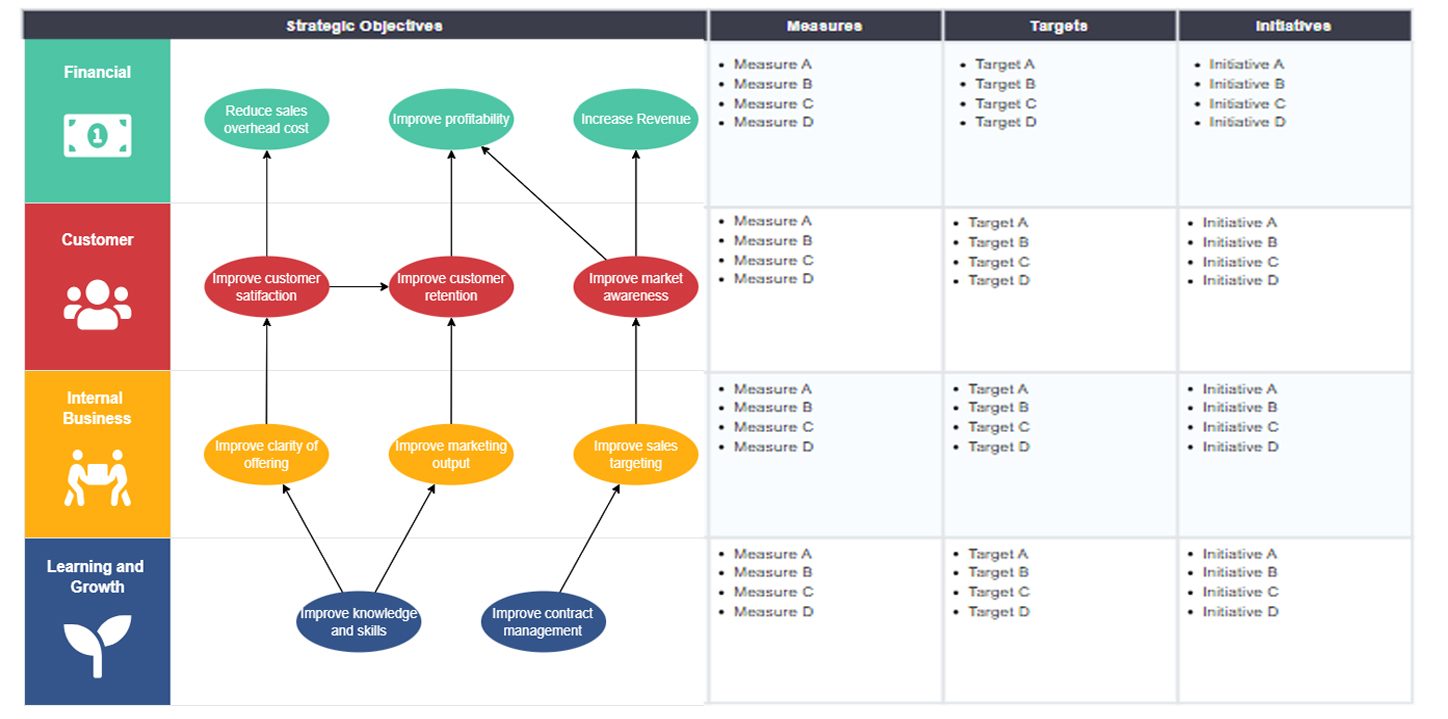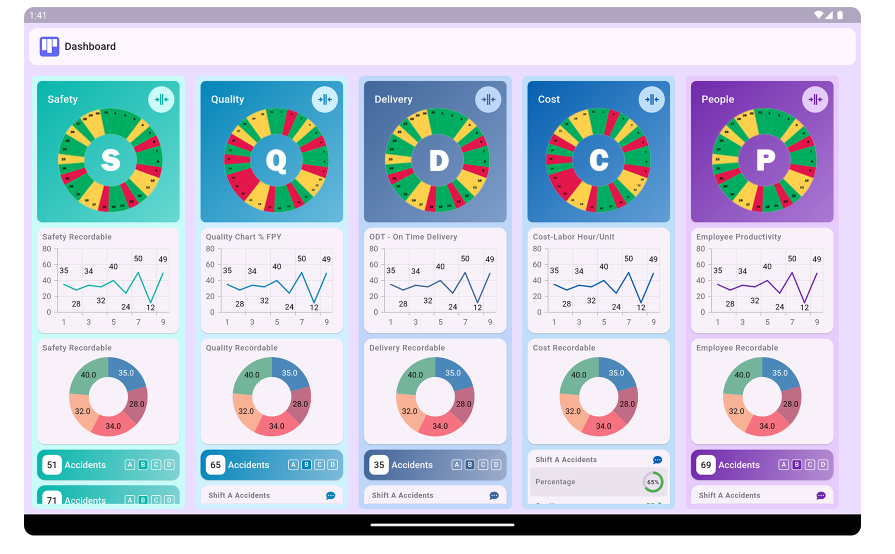What is Balanced Scorecard Software?
Balanced Scorecard Software is a strategic performance management tool that enables organizations to monitor key performance indicators (KPIs), align business activities with strategic objectives, and measure progress across critical areas. Developed to bridge the gap between strategy and execution, the software focuses on four key perspectives:
- Financial Performance: Tracks revenue growth, profitability, and cost management.
- Customer Satisfaction: Evaluates customer experience, retention, and satisfaction levels.
- Internal Processes: Monitors efficiency and productivity within operational workflows.
- Learning and Growth: Focuses on employee development, innovation, and organizational improvements.
By visualizing these perspectives in a unified platform, Balanced Scorecard Software allows businesses to maintain focus on long-term goals while managing daily operations effectively.

Key Features of Balanced Scorecard Software
1. Strategic Goal Alignment
Balanced Scorecard Software ensures that organizational goals are clearly defined and communicated across all levels. By aligning individual, departmental, and organizational objectives, it creates a roadmap for achieving strategic priorities. Users can link initiatives and tasks to overarching goals, fostering accountability and transparency throughout the organization.
2. Interactive Dashboards
The software offers dynamic dashboards that provide a visual representation of key performance metrics. These dashboards display real-time data, enabling stakeholders to monitor progress, identify trends, and make informed decisions. Customizable charts, graphs, and scorecards present complex data in an easy-to-understand format.

3. Key Performance Indicators (KPIs) Monitoring
KPIs form the backbone of performance management systems. Balanced Scorecard Software allows organizations to define, measure, and track KPIs across all business areas. By setting specific targets and benchmarks, companies can evaluate performance, identify gaps, and implement corrective actions to stay on track.
4. Performance Reporting
Comprehensive reporting capabilities provide detailed insights into organizational performance. Reports can be generated automatically, customized to meet specific requirements, and shared with relevant stakeholders. This feature enhances transparency and enables leaders to assess progress against strategic objectives.
5. Business Intelligence Integration
The integration of business intelligence (BI) tools empowers organizations to analyze data effectively and uncover valuable insights. By combining BI with Balanced Scorecard Software, businesses can make data-driven decisions, predict future trends, and identify opportunities for improvement.
6. Automated Workflows and Alerts
The software streamlines processes with automated workflows, ensuring tasks and projects are completed on time. Alerts and notifications help stakeholders stay informed about critical milestones, performance deviations, and upcoming deadlines, fostering a proactive approach to performance management.
7. Data Visualization and Analytics
Advanced analytics tools within Balanced Scorecard Software enable organizations to analyze large data sets and derive meaningful insights. Through visualizations like heat maps, trend lines, and performance matrices, businesses can identify patterns, monitor progress, and adjust strategies accordingly.
Benefits of Using Balanced Scorecard Software
1. Improved Strategy Execution
Balanced Scorecard Software bridges the gap between strategy formulation and execution. By aligning goals, tracking performance, and providing real-time insights, the software ensures that strategic plans are implemented effectively and efficiently.
2. Enhanced Decision-Making
With access to real-time data and performance insights, leaders can make more informed and timely decisions. The integration of business intelligence tools enables organizations to analyze data, uncover trends, and forecast future performance.
3. Increased Accountability
The software fosters accountability by linking individual and team performance to organizational objectives. Clear goals, KPIs, and progress tracking ensure that every member of the organization understands their role in achieving success.
4. Optimized Performance Monitoring
By tracking KPIs and generating performance reports, Balanced Scorecard Software helps organizations identify strengths, weaknesses, and opportunities for improvement. This proactive approach ensures continuous performance optimization.
5. Greater Organizational Alignment
Balanced Scorecard Software promotes alignment between strategy, operations, and resources. By ensuring that all departments and teams work towards shared goals, the software helps organizations achieve long-term success.
6. Streamlined Reporting
Automated reporting capabilities save time and effort, enabling stakeholders to focus on strategic decision-making. Customized reports provide relevant insights tailored to the needs of different departments and leaders.
7. Enhanced Communication and Collaboration
The software facilitates collaboration by providing a centralized platform for strategy management. Teams can communicate, share updates, and work together to achieve shared goals, fostering a culture of transparency and accountability.
How Balanced Scorecard Software Supports Business Intelligence
Balanced Scorecard Software integrates seamlessly with business intelligence tools, enhancing data analysis and decision-making processes. By combining strategic performance management with BI capabilities, organizations gain access to actionable insights that drive growth. Key ways the software supports business intelligence include:
- Data Integration: Consolidates data from multiple sources to provide a holistic view of organizational performance.
- Predictive Analytics: Leverages historical data to forecast trends, identify risks, and uncover opportunities.
- Real-Time Insights: Provides up-to-date information for quick and accurate decision-making.
- Customizable Dashboards: Offers visualizations that help stakeholders understand complex data easily.
By harnessing the power of business intelligence, Balanced Scorecard Software empowers organizations to transform data into actionable strategies.
Choosing the Right Balanced Scorecard Software
When selecting Balanced Scorecard Software, it is essential to consider the specific needs and objectives of your organization. Key factors to evaluate include:
- Ease of Use: The software should be user-friendly, with intuitive navigation and customizable features.
- Scalability: Ensure the software can grow with your organization and adapt to evolving needs.
- Integration Capabilities: Choose software that integrates seamlessly with existing tools and systems.
- Customization: Look for solutions that allow you to tailor dashboards, reports, and KPIs to suit your organization's requirements.
- Support and Training: Reliable customer support and training resources are critical for successful implementation.
Balanced Scorecard Software is a powerful tool for organizations seeking to align their strategies, monitor performance, and drive continuous improvement. By integrating business intelligence, interactive dashboards, and performance management systems, the software enables leaders to make data-driven decisions and achieve long-term success. Whether you aim to improve financial performance, enhance customer satisfaction, or optimize internal processes, Balanced Scorecard Software provides the framework needed to turn your goals into measurable results.
In a competitive business landscape, adopting Balanced Scorecard Software is essential for achieving sustainable growth, fostering accountability, and ensuring that strategic objectives are executed effectively. With its comprehensive features and data-driven insights, it is the ultimate solution for organizations striving to achieve operational excellence and strategic success.
Balanced Scorecard Software: FAQs
1. What is Balanced Scorecard Software?
Balanced Scorecard Software is a strategic management tool that helps organizations track key performance indicators (KPIs), align strategies, and measure performance across key perspectives like financials, customers, internal processes, and growth.
2. How does Balanced Scorecard Software improve strategy execution?
It bridges the gap between planning and execution by aligning organizational goals, tracking performance, and providing real-time insights, ensuring effective implementation of strategic plans.
3. What are the four perspectives of a Balanced Scorecard?
The four perspectives are Financial Performance, Customer Satisfaction, Internal Processes, and Learning and Growth. These ensure a balanced view of organizational performance.
4. How do KPIs work in Balanced Scorecard Software?
KPIs, or Key Performance Indicators, are metrics used to measure and evaluate performance against specific goals. Balanced Scorecard Software tracks these KPIs to ensure progress and identify areas for improvement.
5. Can the software integrate with other tools?
Yes, most Balanced Scorecard Software integrates seamlessly with business intelligence tools, data analytics platforms, and ERP systems to consolidate data and provide actionable insights.
6. How does Balanced Scorecard Software help with decision-making?
The software provides real-time performance data, analytics, and customizable dashboards that enable leaders to make informed, data-driven decisions.
7. What industries benefit from Balanced Scorecard Software?
Industries such as manufacturing, healthcare, education, finance, and retail can benefit by aligning strategy, improving performance, and driving growth with Balanced Scorecard Software.
8. How does the software track financial performance?
It monitors financial metrics such as revenue growth, profit margins, and cost management to provide insights into financial health and sustainability.
9. Is Balanced Scorecard Software customizable?
Yes, it offers customizable dashboards, reports, and KPIs, allowing organizations to tailor the software to their specific needs and objectives.
10. How does it improve organizational alignment?
The software aligns individual, team, and departmental objectives with organizational goals, ensuring everyone works toward shared strategic priorities.
11. What are the benefits of using Balanced Scorecard Software?
Benefits include improved strategy execution, better decision-making, enhanced accountability, optimized performance tracking, and greater organizational alignment.
12. Can Balanced Scorecard Software generate automated reports?
Yes, it can generate automated and customizable performance reports, saving time and providing detailed insights for stakeholders.
13. How does Balanced Scorecard Software improve internal processes?
By tracking process efficiency, productivity, and performance, the software helps identify bottlenecks and optimize workflows.
14. Does the software offer real-time performance monitoring?
Yes, it provides real-time dashboards and alerts, enabling stakeholders to monitor progress and address deviations promptly.
15. How does it support employee development?
The software tracks learning and growth metrics, such as training completion and skill development, to promote workforce improvement.
16. Is the software scalable for growing businesses?
Yes, Balanced Scorecard Software is designed to scale and adapt to the changing needs of growing businesses.
17. How does data visualization help in performance management?
Data visualizations like charts, graphs, and scorecards simplify complex data, enabling stakeholders to identify trends and make strategic decisions quickly.
18. What role does business intelligence play in Balanced Scorecard Software?
Business intelligence tools enhance the software by enabling advanced data analysis, predictive insights, and a comprehensive understanding of performance trends.
19. Can Balanced Scorecard Software identify underperforming areas?
Yes, the software tracks KPIs and highlights areas that need improvement, allowing organizations to address weaknesses and optimize performance.
20. How do automated alerts and workflows improve performance management?
Automated alerts notify stakeholders of critical updates, milestones, and deviations, while workflows streamline task management to ensure timely progress and accountability.